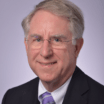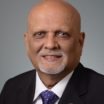Endodontists Selected by FDI General Assembly for Leadership Posts
Compiled by Michael Dobrow


During its 2021 World Dental Congress – Special Edition in September, the FDI World Dental Federation’s General Assembly elected AAE members Dr. Gregory Chadwick as its President-elect and Dr. Chad Gehani to the FDI Council. The two were elected to help address global oral health needs. AAE Integrated Communications Specialist Michael Dobrow recently caught up with them to learn more about their background and what their new roles mean for the endodontic specialty.
Dobrow: Thank you both for your time and congratulations on your new roles! Can you tell me where you attended your respective dental schools and more about your roles with the FDI and ADA?
Dr. Chadwick: Thank you! I am happy to participate in this feature. I attended the University of North Carolina School of Dentistry where I received my DDS in General Dentistry in 1973 and earned my MS in Endodontics in 1976. I’m privileged to have served in many different dental leadership roles which include: Speaker of the General Assembly, Treasurer, member of the FDI Council, Executive Committee and Delegate and Alternate Delegate to the General Assembly. Additionally, I have served as President of the American Dental Association (2000-2001).
Dr. Gehani: It is always great to connect, thank you. My current title at the FDI is Councilor of the FDI. This is like as being a member of the Board of Trustees in ADA – the FDI elects ten Councilors globally – who oversee the managing governing body of the FDI. I am also the Immediate Past President of the ADA, and I completed my General Practice residency at The Beekman Downtown Hospital (Affiliated with the New York University) in 1978. I completed my Endodontic training at Columbia University in 1981.
Dobrow: What inspired you both to become endodontists?
Dr. Chadwick: In the early ‘70s, endodontics was the newest specialty. The idea of being able to relieve pain and “save” teeth that may have otherwise been extracted was very appealing to me. There were also very few endodontists at the time and even fewer diplomates which provided more incentive. In the end, it was mentor Endodontists like Jack Shankle, Worth Gregory, Gerald Cathey and Stuart Fountain who provided the inspiration and opened the doors.
Dr. Gehani: I was drawn to the pain relief component of endodontics. I wanted to help relieve people of their tooth pain and swelling. I also felt the specialty played an important part in helping general dentists detect patient pain.
Dobrow: In addition to the problems brought on by the pandemic, what are some of the immediate and long-term challenges endodontists may be facing?
Dr. Chadwick: Endodontics is largely a referral specialty. In the near term, if dental practices are slow to rebound and don’t continue to grow, general dentists may not continue to refer patients, but opt to provide care they can perform themselves. In the longer term, changing practice models may be challenging for endodontists who wish to remain in more traditional practice models.
Dr. Gehani: Finding dental team members is currently a major challenge and may continue to be one in the future. Likewise, our overhead expenses will keep increasing, but our fees will remain the same. This means running a solo practice will be much more challenging.
Dobrow: Similarly, what do you think some of the solutions may be?
Dr. Chadwick: Ensuring a strong endodontic presence in dental programs so that endodontics remains a vital and relevant treatment option in patient care is certainly one solution. Other solutions include expanding research that demonstrates the efficacy and success of endodontics while developing methods of delivering care at reduced costs, or at least costs that are comparable to rival treatment options.
Dr. Gehani: The organized dentistry and dental education community need to invest in training dental team members. Associations like the AAE need to be at the table with the third-party payers. We also need to let the profession and public know of the importance of saving teeth. Now more than ever – it’s important to partner with the general practice community too.
Dobrow: It’s quite an honor for the AAE to have two of its own elected to these roles with FDI. How will your perspective as endodontists help you perform in these positions, as well as strengthen the specialty?
Dr. Chadwick: Often, when we serve at the various state, national or international levels promoting and furthering optimal oral health, we do this as “dentists”. Clearly our background as a practitioner, specialist, researcher, or educator may inform our position, but as we are successful in improving oral health, and making the case for oral health as an essential part of general health, dentistry becomes a higher priority and consequently endodontics is strengthened. Or to put it another way – on the rising tide of optimal oral health all boats, including endodontics, rise.
Dr. Gehani: I have always promoted endodontics as a surgical procedure. I intend to leverage my position to continue promoting the specialty and advocating for the use of the dental dam – where in many parts of the world it is still not is use.




